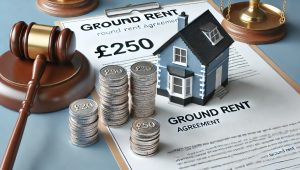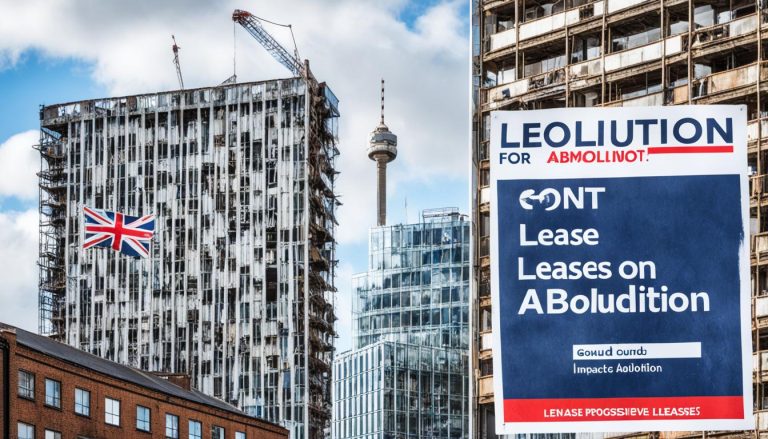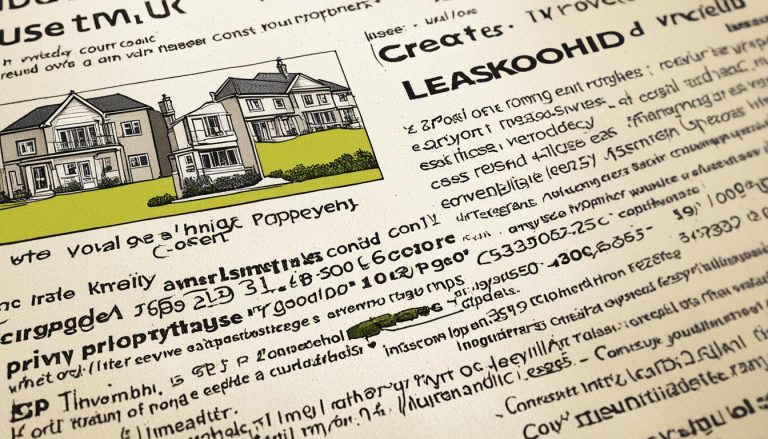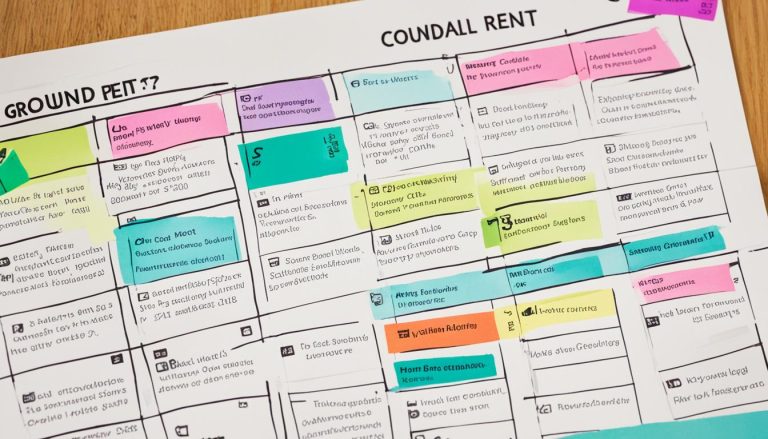Ground rent is a fundamental aspect of owning a leasehold property in the UK, but when this fee exceeds £250 per year, it introduces a range of legal and financial complications.
Many leaseholders are unaware that a ground rent over £250 can reclassify their lease as an Assured Shorthold Tenancy (AST), opening the door to repossession risks.
This issue is particularly significant in the wake of the Leasehold Reform (Ground Rent) Act 2022, which aims to limit ground rents in new leases but leaves existing leaseholders exposed.
This guide will break down everything homeowners and leaseholders need to know about ground rent over £250, its legal implications, and the steps you can take to protect your property and financial future.
What is Ground Rent?
Ground rent is a fee leaseholders pay to the freeholder (or landowner) as part of their leasehold agreement. Unlike service charges, which cover property maintenance, ground rent is simply a payment for the right to live on the land.
How is Ground Rent Calculated?
Ground rent is specified in the lease agreement and can be either:
- Fixed Ground Rent: A set amount paid annually, e.g., £100 per year.
- Escalating Ground Rent: Rent that increases periodically, often every 5, 10, or 25 years. The increase may be linked to inflation (Retail Price Index) or set at a percentage increase (e.g., doubling every 10 years).
The Legal Significance of Ground Rent Over £250

The legal classification of a lease can change when ground rent exceeds £250 (or £1,000 in London), subjecting it to the Housing Act 1988.
This classification could mean the lease is treated as an Assured Shorthold Tenancy (AST), giving the freeholder certain rights to repossess the property if rent payments are missed.
How Does the Housing Act 1988 Affect Leaseholders?
The Housing Act 1988 allows freeholders to seek possession of properties using Ground 8 repossession rules. This means:
- If a leaseholder misses two months of ground rent payments, the freeholder can seek repossession.
- Unlike other debt claims, “Ground 8” does not require a court’s discretion. If the amount owed is over two months, possession is almost guaranteed.
How Does the Leasehold Reform (Ground Rent) Act 2022 Help?
The Leasehold Reform Act aims to protect leaseholders from escalating ground rents, but it only applies to new leases granted after 30 June 2022. Key points:
- New leases have ground rent set at zero (peppercorn rent).
- Existing leases are not protected, meaning current leaseholders with ground rent over £250 remain at risk.
How Ground Rent Over £250 Affects Homeowners and Leaseholders?

The consequences of ground rent exceeding £250 per year extend beyond simple payments. It introduces legal, financial, and property ownership challenges that affect leaseholders in ways many are unaware of.
This situation arises because, under the Housing Act 1988, a lease with a ground rent over £250 (or £1,000 in London) can be classified as an Assured Shorthold Tenancy (AST). This classification exposes leaseholders to potential repossession risks, affects mortgage applications, and reduces the value and marketability of the property.
Here’s a deeper look at how this issue affects leaseholders and homeowners.
1. Risk of Repossession
One of the most significant consequences of having a lease classified as an AST is the risk of repossession. Under the Housing Act 1988, the freeholder can initiate repossession proceedings if the leaseholder falls behind on ground rent payments for more than two months.
The process works as follows:
- If a leaseholder misses two months of ground rent payments, the freeholder has the right to issue a formal demand.
- If payment is not made, the freeholder can invoke Ground 8 of the Housing Act 1988, which allows them to seek possession of the property.
- Unlike other types of debt collection, the court has no discretion to deny possession once it is established that rent arrears exceed two months.
This is a significant risk because even a small oversight in payment could result in the loss of a home. Many leaseholders don’t realize their lease could be classified as an AST, so they are unaware of the severe implications of missed payments.
2. Impact on Mortgages and Property Sales
Another critical consequence of ground rent over £250 is the impact it has on mortgage applications and property sales. Mortgage lenders are becoming increasingly cautious about lending against leasehold properties where the ground rent exceeds this threshold.
Mortgage Approval Issues
When a lender sees that a lease may be classified as an AST, it raises red flags for several reasons:
- Repossession Risk: If the leaseholder defaults on rent, the lender could lose its interest in the property.
- Property Value Decline: Properties with high ground rent are seen as less valuable, which affects the lender’s security.
Lenders typically refuse to offer mortgages on properties where the lease can be classified as an AST. Buyers may be unable to get financing, limiting the pool of potential buyers. As a result, homeowners find it difficult to sell their properties or may be forced to reduce the asking price.
3. Challenges with Remortgaging
Even for current property owners, ground rent over £250 can pose significant issues when trying to remortgage. Most mortgage providers conduct a lease review before approving a remortgage.
If the lease is classified as an AST, lenders may decline the application. This leaves homeowners trapped with their existing mortgage provider, limiting their financial flexibility.
4. Reduced Property Value and Marketability
Properties with high ground rent tend to have lower market value. Buyers are wary of properties with escalating ground rent because it adds to the cost of ownership and exposes them to legal risks.
If ground rent is above £250, buyers may also face mortgage rejections, which limits the pool of potential buyers. As a result, leaseholders may need to lower the sale price to attract buyers or renegotiate their ground rent through a Deed of Variation before listing the property for sale.
5. Cost of Lease Extension or Deed of Variation
To avoid these issues, many leaseholders attempt to reduce or eliminate their ground rent through a Deed of Variation or lease extension. However, both options come with financial and legal implications.
Deed of Variation
This involves negotiating with the freeholder to change the lease terms. Here’s how it works:
- Costs: Leaseholders are responsible for their own legal fees as well as the freeholder’s legal fees.
- Process: It involves formal negotiations and the issuance of a new lease document reflecting the reduced ground rent.
Lease Extension
A statutory lease extension offers more permanent protection. When a lease is extended, ground rent is reduced to zero (peppercorn rent).
The cost of extending a lease depends on factors like the unexpired term of the lease and the property’s value. However, this process is often lengthy and costly, involving solicitor fees, valuation costs, and compensation payments to the freeholder.
What Should Homeowners and Leaseholders Do?

If your ground rent exceeds £250 per year (or £1,000 in London), it’s crucial to understand the potential risks and take action to protect your home and financial interests. Since ground rent above this threshold can reclassify your lease as an Assured Shorthold Tenancy (AST), the risk of repossession, mortgage complications, and property devaluation becomes a reality.
To safeguard your property, leaseholders should be proactive in identifying risks, exploring legal options, and seeking expert guidance. Here are some key steps homeowners and leaseholders should consider:
1. Review Your Lease Agreement
Start by carefully reviewing your lease to understand the terms surrounding ground rent. Pay attention to:
- Annual Ground Rent Amount: If it’s over £250 (£1,000 in London), your lease may be classified as an AST under the Housing Act 1988.
- Escalation Clauses: Some leases have ground rent that increases periodically, often doubling every 10, 25, or 50 years. If your ground rent is set to increase beyond £250, you should act now before the increase takes effect.
- Mortgagee Protection Clause: Check if your lease contains this clause, as it offers some protection for lenders and may reduce the risk of repossession.
If you are unsure how to interpret the lease, seek legal advice from a property solicitor. They can help identify clauses that could impact your rights as a leaseholder.
2. Negotiate a Deed of Variation
If your ground rent exceeds £250, you may be able to negotiate a Deed of Variation with the freeholder. This is a formal change to the lease that reduces or caps the ground rent at a lower level. Key points to consider:
- Initiate Contact with the Freeholder: Approach your freeholder and request a lease amendment to reduce ground rent to a safe level (preferably under £250).
- Be Prepared for Costs: Leaseholders are typically responsible for the legal fees of both their solicitor and the freeholder’s solicitor. The total cost will depend on the complexity of the case.
- Get Legal Support: A solicitor can assist with the negotiation process, ensuring that your rights are fully protected.
A Deed of Variation is often a quicker and less expensive option compared to a lease extension. However, it depends on the freeholder’s willingness to cooperate.
3. Pursue a Lease Extension
Another effective option is to pursue a statutory lease extension. Under the Leasehold Reform, Housing and Urban Development Act 1993, leaseholders have the legal right to extend their lease by 90 years, reducing ground rent to a “peppercorn rent” (effectively zero).
This option offers permanent protection from ground rent escalation and avoids the need for further negotiations with the freeholder.
How to Apply for a Lease Extension?
- Qualify for the Extension: The lease must have been originally granted for more than 21 years, and you must have owned the property for at least 2 years.
- Instruct a Surveyor: A surveyor will calculate the premium (payment) you must make to the freeholder for the lease extension.
- Negotiate with the Freeholder: Once the premium is calculated, you can negotiate with the freeholder. If an agreement isn’t reached, you can take the matter to a property tribunal.
The cost of a lease extension depends on factors like the current ground rent, the number of years remaining on the lease, and the property’s market value. While this process can be more costly than a Deed of Variation, it offers a permanent solution to the ground rent issue.
4. Seek Legal Advice
If you’re unsure how to protect yourself from the risks of ground rent over £250, consulting a property solicitor is essential. A solicitor can:
- Review Your Lease: Identify if your lease qualifies as an AST and spot risky clauses.
- Provide Legal Protection: Help you negotiate a Deed of Variation or initiate a lease extension.
- Mitigate Repossession Risks: Advise you on how to avoid falling into arrears or negotiate payment plans with your freeholder.
With the Leasehold Reform (Ground Rent) Act 2022 only applying to new leases, it’s essential that leaseholders with existing leases take control of their situation. By reviewing your lease, negotiating changes, and seeking expert advice, you can protect your property and financial stability.
What Are the Solutions and Protections for Leaseholders?

Mortgagee Protection Clause
This clause can protect mortgage lenders from repossession risks caused by unpaid ground rent. Check if your lease contains this clause.
Indemnity Insurance
If repossession risks exist, indemnity insurance can cover potential losses. This option is often used during property sales to satisfy mortgage lenders.
Statutory Lease Extension
Leaseholders can apply for a statutory lease extension. This process reduces ground rent to zero. Here’s how it works:
- Lease must be longer than 21 years.
- Leaseholders can add 90 years to their lease and reduce ground rent to zero.
What Are the Key Takeaways for Homeowners and Leaseholders?

- Ground rent over £250 can reclassify a lease as an AST, increasing the risk of repossession.
- Leaseholders should review their lease and consider a Deed of Variation or lease extension.
- The Leasehold Reform (Ground Rent) Act 2022 only protects new leases; existing leases are not affected.
- Seek legal advice if you suspect your lease qualifies as an AST.
FAQ Ground Rent Over £250
What is ground rent?
Ground rent is a fee paid to the freeholder for the right to occupy a property under a lease. It is specified in the lease agreement and may be fixed or escalate over time.
How does ground rent over £250 affect mortgage applications?
Mortgage lenders may refuse applications for properties classified as ASTs due to the risk of repossession.
How can I reduce my ground rent?
You can reduce your ground rent by negotiating a Deed of Variation or applying for a statutory lease extension.
What is the Leasehold Reform Act 2022?
The Act limits ground rent for new leases to zero (peppercorn rent). However, it does not apply to existing leases.
Can my property be repossessed for unpaid ground rent?
Yes. If your ground rent is over £250, your lease could be classified as an AST, allowing the freeholder to seek repossession under “Ground 8” rules.
Can I extend my lease to avoid ground rent?
Yes. A statutory lease extension reduces ground rent to zero, but it involves legal fees and a premium.
How can I check if my lease is an AST?
Check your lease for clauses regarding ground rent and see if it exceeds £250 (£1,000 in London).






